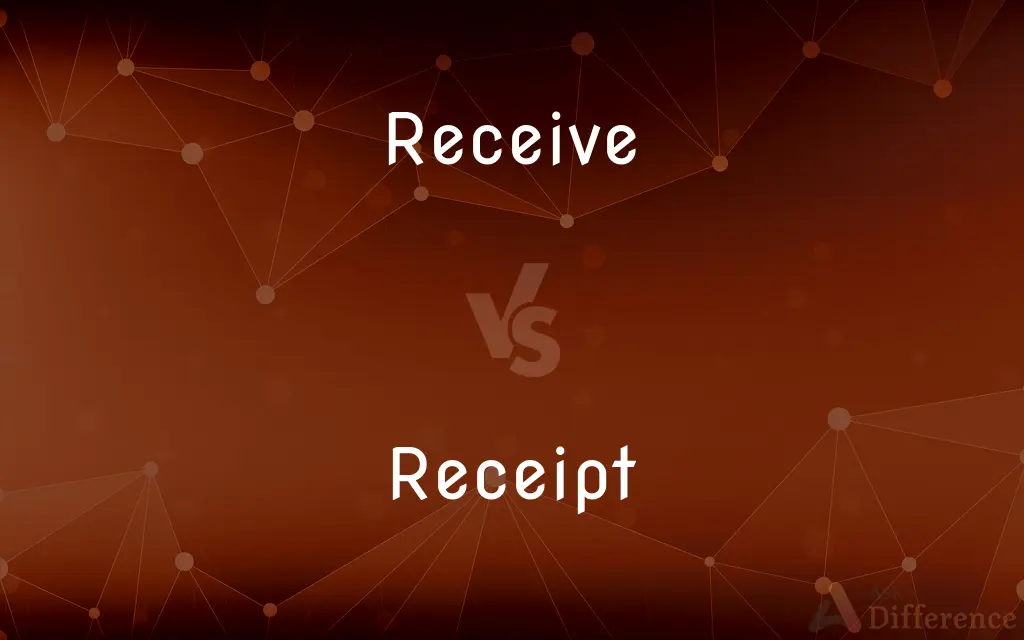Receive vs. Receipt — What's the Difference?
Edited by Tayyaba Rehman — By Fiza Rafique — Updated on October 25, 2023
Receive is the act of getting something; Receipt is the written proof of that act.

Difference Between Receive and Receipt
Table of Contents
ADVERTISEMENT
Key Differences
Receive refers to the action of obtaining or accepting something that has been sent or given. It's an active verb that denotes the process of coming into possession of an item or information. Receipt, on the other hand, signifies a written acknowledgment, usually indicating that something has been received.
Both words, Receive and Receipt, connect to the idea of acquiring something, but they highlight different aspects of that process. When one talks about the action itself, they might say they "receive a package." Conversely, if they want to discuss the documentation of that action, they'd refer to the "receipt of the package."
Both words have a close relationship in transactional contexts. Receive is the action you'd perform when you get something, and a Receipt is what you might get afterwards as a record. These terms are essential in contexts like shopping, where the act of receiving goods goes hand in hand with obtaining a receipt as proof of purchase.
Comparison Chart
Nature
Verb
Noun
Purpose
Denotes action
Provides documentation
ADVERTISEMENT
Usage
"Receive a call"
"Get a receipt"
Associated With
Process
Proof/Record
Context
Transactional, communicative
Transactional, evidentiary
Compare with Definitions
Receive
To take into one's possession.
I will Receive the package tomorrow.
Receipt
A written acknowledgment of having received something.
I need the Receipt for my expenses.
Receive
To listen or attend to.
I Received a call from an unknown number.
Receipt
A record of a transaction.
Keep the Receipt in case of returns.
Receive
To experience or undergo.
The news was not well Received.
Receipt
A piece of paper or electronic document verifying a purchase.
The cashier handed me the Receipt.
Receive
To take or acquire (something given or offered); get or be given
Receive a present.
Receipt
Proof of a completed transaction or payment.
The Receipt showed the date and amount paid.
Receive
To be the person who gets (something sent or transmitted)
Receive an email.
Receipt
The act of receiving or the state of being received.
The Receipt of the letter was confirmed.
Receive
(Sports) To catch or get possession of (a pass or a kicked ball, for example).
Receipt
A receipt (also known as a packing list, packing slip, packaging slip, (delivery) docket, shipping list, delivery list, bill of parcel, manifest or customer receipt) is a document acknowledging that a person has received money or property in payment following a sale or other transfer of goods or provision of a service. All receipts must have the date of purchase on them.
Receive
To have (a title, for example) bestowed on oneself.
Receipt
The action of receiving something or the fact of its being received
Families in receipt of supplementary benefit
I would be grateful if you would acknowledge receipt of this letter
Receive
To hear or see (information, for example)
Receive bad news.
Receipt
A recipe
She spent hours in the kitchen, trying all sorts of receipts
Receive
To perceive or acquire mentally
Receive a bad impression.
Receipt
Mark (a bill) as paid
The receipted hotel bill
Receive
To regard with approval or disapproval
Ideas that were received well.
Receipt
The act of receiving
We are in receipt of your letter.
Receive
To listen to and acknowledge formally and authoritatively
The judge received their oath of allegiance.
Receipt
The fact of being or having been received
They denied receipt of the shipment.
Receive
To take in and convert (radio waves, for example) into an electrical signal or into an audio or visual output.
Receipt
Often receipts A quantity or amount received
Cash receipts.
Receive
To experience or be subjected to; meet with
Receive sympathetic treatment.
Receipt
A written acknowledgment that a specified article, sum of money, or shipment of merchandise has been received.
Receive
To have inflicted or imposed on oneself
Receive a penalty.
Receipt
A recipe.
Receive
To bear the weight or force of; support
The beams receive the full weight of the walls and roof.
Receipt
To mark (a bill) as having been paid.
Receive
To take or intercept the impact of (a blow, for example).
Receipt
To give or write a receipt for (money paid or goods or services delivered).
Receive
To be exposed to or withstand
The hillside cottage receives strong winds.
Receipt
To give a receipt.
Receive
To take in, hold, or contain
A tank that receives rainwater.
Receipt
The act of receiving, or the fact of having been received.
A balance payable on receipt of the goods.
Receive
To admit or accept
Receive new members.
Receipt
(obsolete) The fact of having received a blow, injury etc.
Receive
To greet, welcome, or be visited by
Receive guests.
Receipt
(in the plural) A quantity or amount received; takings.
This weekend's receipts alone cover our costs to mount the production!
Receive
To acquire or get something; be a recipient.
Receipt
A written acknowledgment that a specified article or sum of money has been received.
Receive
To admit or welcome guests or visitors
The couple are not receiving this winter.
Receipt
(A piece of) evidence, documentation, etc. to prove one's past actions, accomplishments, etc.
Receive
To partake of the Eucharist.
Receipt
(A piece of) evidence (e.g. documentation or screen captures) of past wrongdoing.
Receive
To convert incoming electromagnetic signals into sound, light, or electrical signals.
Receipt
(archaic in New England and rural US since end of 20th century, elsewhere since middle of 20th century) A recipe, instructions, prescription.
Receive
(Sports) To receive a pass or a kicked ball, for example.
Receipt
(obsolete) A receptacle.
Receive
To take, as something that is offered, given, committed, sent, paid, etc.; to accept; to be given something.
She received many presents for her birthday.
Receipt
(obsolete) A revenue office.
Receive
(law) To take goods knowing them to be stolen.
Receipt
(obsolete) Reception, as an act of hospitality.
Receive
To act as a host for guests; to give admittance to; to permit to enter, as into one's house, presence, company, etc.
To receive a lodger, visitor, ambassador, messenger, etc.
Receipt
(obsolete) Capability of receiving; capacity.
Receive
To incur (an injury).
I received a bloody nose from the collision.
Receipt
(obsolete) A recess; a retired place.
Receive
To allow (a custom, tradition, etc.); to give credence or acceptance to.
Receipt
To give or write a receipt (for something).
To receipt delivered goods
Receive
(telecommunications) To detect a signal from a transmitter.
Receipt
To put a receipt on, as by writing or stamping; to mark a bill as having been paid.
To receipt a bill
Receive
(sports) To be in a position to take possession, or hit back the ball.
Receipt
The act of receiving; reception.
Receive
To be in a position to hit back a service.
Receipt
Reception, as an act of hospitality.
Thy kind receipt of me.
Receive
(American football) To be in a position to catch a forward pass.
Receipt
Capability of receiving; capacity.
It has become a place of great receipt.
Receive
To accept into the mind; to understand.
Receipt
Place of receiving.
He saw a man, named Matthew, sitting at the receipt of custom.
Receive
(telecommunications) An operation in which data is received.
Receipt
Hence, a recess; a retired place.
Receive
To take, as something that is offered, given, committed, sent, paid, or the like; to accept; as, to receive money offered in payment of a debt; to receive a gift, a message, or a letter.
Receyven all in gree that God us sent.
Receipt
A formulary according to the directions of which things are to be taken or combined; a recipe; as, a receipt for making sponge cake.
She had a receipt to make white hair black.
Receive
Hence: To gain the knowledge of; to take into the mind by assent to; to give admission to; to accept, as an opinion, notion, etc.; to embrace.
Our hearts receive your warnings.
The idea of solidity we receive by our touch.
Receipt
A writing acknowledging the taking or receiving of goods delivered; an acknowledgment of money paid.
Receive
To allow, as a custom, tradition, or the like; to give credence or acceptance to.
Many other things there be which they have received to hold, as the washing of cups, and pots.
Receipt
That which is received; that which comes in, in distinction from what is expended, paid out, sent away, and the like; - usually in the plural; as, the receipts amounted to a thousand dollars.
Receive
To give admittance to; to permit to enter, as into one's house, presence, company, and the like; as, to receive a lodger, visitor, ambassador, messenger, etc.
They kindled a fire, and received us every one.
Receipt
To give a receipt for; as, to receipt goods delivered by a sheriff.
Receive
To admit; to take in; to hold; to contain; to have capacity for; to be able to take in.
The brazen altar that was before the Lord was too little to receive the burnt offerings.
Receipt
To put a receipt on, as by writing or stamping; as, to receipt a bill.
Receive
To be affected by something; to suffer; to be subjected to; as, to receive pleasure or pain; to receive a wound or a blow; to receive damage.
Against his will he can receive no harm.
Receipt
To give a receipt, as for money paid.
Receive
To take from a thief, as goods known to be stolen.
Receipt
The act of receiving
Receive
To bat back (the ball) when served.
Who, if we knewWhat we receive, would either not acceptLife offered, or soon beg to lay it down.
Receipt
An acknowledgment (usually tangible) that payment has been made
Receive
To receive visitors; to be at home to receive calls; as, she receives on Tuesdays.
Receipt
Report the receipt of;
The program committee acknowledged the submission of the authors of the paper
Receive
To return, or bat back, the ball when served; as, it is your turn to receive.
Receipt
Mark or stamp as paid
Receive
Get something; come into possession of;
Receive payment
Receive a gift
Receive letters from the front
Receive
Receive a specified treatment (abstract);
These aspects of civilization do not find expression or receive an interpretation
His movie received a good review
I got nothing but trouble for my good intentions
Receive
Recieve (perceptual input);
Pick up a signal
Receive
Of mental or physical states or experiences;
Get an idea
Experience vertigo
Get nauseous
Undergo a strange sensation
The chemical undergoes a sudden change
The fluid undergoes shear
Receive injuries
Have a feeling
Receive
Express willingness to have in one's home or environs;
The community warmly received the refugees
Receive
Accept as true or valid;
He received Christ
Receive
Bid welcome to; greet upon arrival
Receive
Convert into sounds or pictures;
Receive the incoming radio signals
Receive
Experience as a reaction;
My proposal met with much opposition
Receive
Have or give a reception;
The lady is receiving Sunday morning
Receive
Receive as a retribution or punishment;
He got 5 years in prison
Receive
Partake of the Holy Eucharist sacrament
Receive
Regard favorably or with disapproval;
Her new collection of poems was not well received
Receive
To be the recipient of.
She will Receive an award for her work.
Receive
To accept from a source.
He Receives a salary every month.
Common Curiosities
Do I always get a Receipt when I Receive something?
Not necessarily, but in transactional contexts, it's common to get a Receipt as proof.
Can Receipt be used as a verb?
Yes, though less common, "receipt" can be a verb meaning to acknowledge receipt of something.
How is Receive different from Receipt?
Receive is a verb denoting action, while Receipt is a noun representing proof or documentation of receiving.
How do I use Receive in a sentence?
"I will Receive the letter by tomorrow."
What does Receive mean?
Receive refers to the act of getting or accepting something that has been sent or given.
Can you use Receive in a passive sense?
Yes, for example: "The letter was Received yesterday."
What is a Receipt?
A Receipt is a written acknowledgment or proof indicating that something has been received.
Is a Receipt only for purchases?
No, Receipts can be for any acknowledgment, like donations or payments.
What's another term for Receipt?
"Acknowledgment" or "proof of purchase" can be alternatives for Receipt.
Is a Receipt always required for returns?
In many retail contexts, yes, a Receipt is often needed for returns to verify purchase.
How do I use Receipt in a sentence?
"Please keep this Receipt for your records."
Is the act of receiving always associated with a physical item?
No, you can Receive information, a message, or even an impression.
What's another word for Receive?
"Obtain" or "accept" can be synonyms for Receive.
Are digital Receipts as valid as paper ones?
Yes, in many contexts, digital Receipts are just as valid as paper ones.
Why is it important to Receive a Receipt?
Receipts serve as proof of transaction, useful for returns, warranties, and financial records.
Share Your Discovery

Previous Comparison
Decapacitate vs. Incapacitate
Next Comparison
Reinstill vs. InstillAuthor Spotlight
Written by
Fiza RafiqueFiza Rafique is a skilled content writer at AskDifference.com, where she meticulously refines and enhances written pieces. Drawing from her vast editorial expertise, Fiza ensures clarity, accuracy, and precision in every article. Passionate about language, she continually seeks to elevate the quality of content for readers worldwide.
Edited by
Tayyaba RehmanTayyaba Rehman is a distinguished writer, currently serving as a primary contributor to askdifference.com. As a researcher in semantics and etymology, Tayyaba's passion for the complexity of languages and their distinctions has found a perfect home on the platform. Tayyaba delves into the intricacies of language, distinguishing between commonly confused words and phrases, thereby providing clarity for readers worldwide.















































